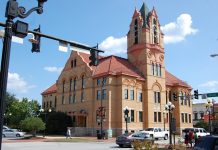By Stan Welch
A small group of Powdersville residents gathered Tuesday night to hear the latest proposal about the subject closest to their hearts, a reduction of taxes. District Six County Councilman Ken Waters, attended by a handful of county staff, as well as county treasurer Jason Phillips, was on hand to pitch the idea of a one cent sales tax to be dedicated to the reduction of the county’s property tax on vehicles.
Waters began by explaining that he, Phillips, and the county staffers had been working on the proposal for a couple of months. The purpose of the proposed one cent sales tax is to reduce the approximately thirty per cent of county property taxes that doesn’t go to the schools.
“I actually wanted to do away with the county property taxes entirely,” said Waters, “but state law won’t allow that. The schools,which in Anderson County receive about seventy per cent of the taxes collected, have to receive those funds. Still, thirty per cent is significant, and this one cent sales tax can make a serious impact on that.”
Despite the preparation and research, Waters and Phillips seemed at times to be on different pages, as they explained the sales tax. Waters referred to it repeatedly as a local option sales tax, which by law has to list and specify the various projects to be funded by the tax, and which has a definite, predetermined shelf life.
For example, the tax, which would have to be approved by a referendum, would include the length of time the tax would be in force before it automatically expired. If the public chose to renew the tax, the process would have to be repeated. Phillips contended that what was actually proposed would be a capital improvement sales tax, which would remain in effect unless or until the voters repealed it.
There also seemed to be some question about just what the revenues would be used for. Both men agreed that the main goal would be to reduce the thirty per cent of county taxes available for reduction. In the early stages of the tax, if approved, sixty three per cent of the revenues would go directly to tax reduction, with an annual two per cent increase in that percentage, until it reached the seventy one per cent ceiling.
When pressed on the matter, Councilman Waters conceded that there could also be a road construction and maintenance component to the tax, as well as a possibility of funding for various recreational projects.
Figures provided by Phillips indicated that the one cent sales tax could generate as much as fourteen million dollars in revenues, with six million six hundred thousand dollars in county property taxes, and an additional three point three million dollars in reductions to the municipalities. Those figures, which both Waters and Phillips described as ‘conservative estimates’ would result in an additional four point one million for projects.
Waters explained that the meeting was the first such gathering. “We’re looking for your input, your ideas. This is very preliminary, and we can’t do anything official until the next general election, when we could put the referendum on the ballot, if the Council votes to do that. We’ll be having more meetings around the county.”















